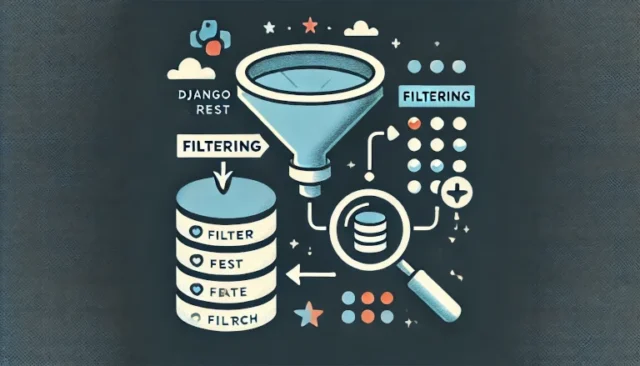In the world of APIs, delivering relevant data to users efficiently is a top priority. Without filtering, your API would return entire datasets, which can overwhelm users and negatively impact performance. This is where filters in Django REST Framework (DRF) come into play. Filters enable you to narrow down the data returned by an API endpoint, ensuring a seamless and user-friendly experience.
This blog post explores why filters are essential in DRF, how they work, and how to implement them in your projects.
What Are Filters in Django REST Framework?
Filters in DRF are tools that allow you to control the data returned by your API. They help you:
- Limit the amount of data a user receives.
- Allow users to query specific subsets of data based on criteria.
- Improve performance by reducing unnecessary database queries.
For instance, a filter can let users retrieve only active records, data within a specific date range, or results that match a search keyword.
Why Filters Are Essential in APIs
Filters serve several crucial purposes in API development:
- Performance Optimization
APIs without filters return all available data, which can slow down the response time, especially with large datasets. Filters reduce the load by fetching only the relevant data. - Improved User Experience
Providing users with the ability to search or filter data ensures they get exactly what they need without scrolling through unnecessary information. - Scalability
Filters allow your API to handle larger datasets gracefully as your application grows. - Customizability
With filters, developers can provide users with dynamic and tailored access to data, making APIs more flexible and powerful.
How to Implement Filters in Django REST Framework
DRF simplifies filtering with its django-filter integration. Follow these steps to add filters to your API.
Step 1: Install django-filter
Ensure you have the django-filter library installed. If not, install it using pip:
pip install django-filter
Add it to your INSTALLED_APPS in settings.py:
INSTALLED_APPS = [
...
'django_filters',
]
Step 2: Apply Filters to Your API
DRF’s FilterSet class makes it easy to define filters. For example, consider a model Product:
from django.db import models
class Product(models.Model):
name = models.CharField(max_length=100)
category = models.CharField(max_length=50)
price = models.DecimalField(max_digits=10, decimal_places=2)
in_stock = models.BooleanField(default=True)
Create a filter class for this model:
import django_filters
from .models import Product
class ProductFilter(django_filters.FilterSet):
class Meta:
model = Product
fields = ['category', 'price', 'in_stock']
Step 3: Integrate Filters into Your View
Use DRF’s DjangoFilterBackend to apply filters in your view:
from rest_framework.viewsets import ReadOnlyModelViewSet
from rest_framework.filters import DjangoFilterBackend
from .models import Product
from .serializers import ProductSerializer
from .filters import ProductFilter
class ProductViewSet(ReadOnlyModelViewSet):
queryset = Product.objects.all()
serializer_class = ProductSerializer
filter_backends = [DjangoFilterBackend]
filterset_class = ProductFilter
Now, users can filter products by category, price, or stock status using query parameters like:
/products/?category=electronics&in_stock=True
Common Filtering Scenarios
- Search Filters
Use DRF’sSearchFilterto allow keyword-based search functionality:
from rest_framework.filters import SearchFilter
class ProductViewSet(ReadOnlyModelViewSet):
queryset = Product.objects.all()
serializer_class = ProductSerializer
filter_backends = [SearchFilter]
search_fields = ['name', 'category']
This enables users to search products by name or category:
/products/?search=laptop
- Ordering Results
Add ordering functionality with DRF’sOrderingFilter:
from rest_framework.filters import OrderingFilter
class ProductViewSet(ReadOnlyModelViewSet):
queryset = Product.objects.all()
serializer_class = ProductSerializer
filter_backends = [OrderingFilter]
ordering_fields = ['price', 'name']
Users can order products by price or name:
/products/?ordering=price
Best Practices for Using Filters
- Combine Filters: Use multiple filter types, such as
SearchFilterandDjangoFilterBackend, for greater flexibility. - Optimize Queries: Ensure that filtered queries are efficient by using indexes on database fields.
- Document Filters: Clearly document the available filters in your API to help users understand how to query data effectively.
Common Issues and Solutions
Error: “No module named ‘django_filters'”
Ensure django-filter is installed and added to INSTALLED_APPS.
Error: “Field does not exist”
Verify that the fields defined in the FilterSet class match the model’s fields.
Performance Issues with Large Datasets
Optimize database queries by adding indexes to frequently filtered fields.
Filters are an essential feature of any well-designed API in the Django REST Framework. They enhance performance, improve user experience, and make your API scalable and flexible. By integrating filters into your DRF views, you can provide users with a powerful and efficient way to interact with your data. Start using filters today to take your API development to the next level.
